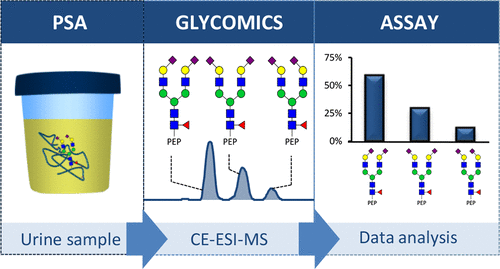当前位置:
X-MOL 学术
›
Anal. Chem.
›
论文详情
Our official English website, www.x-mol.net, welcomes your feedback! (Note: you will need to create a separate account there.)
An In-Depth Glycosylation Assay for Urinary Prostate-Specific Antigen
Analytical Chemistry ( IF 7.4 ) Pub Date : 2018-03-04 00:00:00 , DOI: 10.1021/acs.analchem.7b04281 Guinevere S. M. Kammeijer 1 , Jan Nouta 1 , Jean J. M. C. H. de la Rosette 2 , Theo M. de Reijke 3 , Manfred Wuhrer 1
Analytical Chemistry ( IF 7.4 ) Pub Date : 2018-03-04 00:00:00 , DOI: 10.1021/acs.analchem.7b04281 Guinevere S. M. Kammeijer 1 , Jan Nouta 1 , Jean J. M. C. H. de la Rosette 2 , Theo M. de Reijke 3 , Manfred Wuhrer 1
Affiliation

|
The concentration of prostate-specific antigen (PSA) in serum is used as an early detection method of prostate cancer (PCa); however, it shows low sensitivity, specificity, and a poor predictive value. Initial studies suggested the glycosylation of PSA to be a promising marker for a more specific yet noninvasive PCa diagnosis. Recent studies on the molecular features of PSA glycosylation (such as antenna modification and core fucosylation) were not successful in demonstrating its potential for an improved PCa diagnosis, probably due to the lack of analytical sensitivity and specificity of the applied assays. In this study, we established for the first time a high-performance PSA Glycomics Assay (PGA), allowing differentiation of α2,6- and α2,3-sialylated isomers, the latter one being suggested to be a hallmark of aggressive types of cancer. After affinity purification from urine and tryptic digestion, PSA samples were analyzed by CE-ESI-MS (capillary electrophoresis–electrospray ionization coupled to mass spectrometry). Based on positive controls, an average interday relative standard deviation of 14% for 41 N-glycopeptides was found. The assay was further verified by analyzing PSA captured from patients’ urine samples. A total of 67 N-glycopeptides were identified from the PSA pooled from the patients. In summary, the first PGA successfully established in this study allows an in-depth relative quantitation of PSA glycoforms from urine. The PGA is a promising tool for the determination of potential glycomic biomarkers for the differentiation between aggressive PCa, indolent PCa, and benign prostate hyperplasia in larger cohort studies.
中文翻译:

尿中前列腺特异性抗原的深度糖基化检测
血清中前列腺特异性抗原(PSA)的浓度被用作前列腺癌(PCa)的早期检测方法。但是,它显示出低敏感性,特异性和较差的预测价值。初步研究表明,PSA的糖基化将成为更具体但无创性PCa诊断的有前途的标志物。对PSA糖基化的分子特征(例如天线修饰和核心岩藻糖基化)的最新研究未能成功地证明其对PCa诊断的改善潜力,这可能是由于缺乏所应用测定的分析灵敏度和特异性所致。在这项研究中,我们首次建立了高性能PSA糖分析(PGA),可区分α2,6-和α2,3-唾液酸化异构体,后者被认为是侵略性癌症的标志。从尿液中亲和纯化并经胰蛋白酶消化后,通过CE-ESI-MS(毛细管电泳-电喷雾电离与质谱联用)分析PSA样品。根据阳性对照,41的平均日相对相对标准偏差为14%发现了N-糖肽。通过分析从患者尿液样本中捕获的PSA,进一步验证了该测定方法。从患者收集的PSA中鉴定出总共67个N-糖肽。总之,在这项研究中成功建立的第一个PGA允许对尿液中PSA糖型进行深入的相对定量。在较大的队列研究中,PGA是一种有潜力的工具,可用于确定潜在的糖类生物标志物,以区分侵袭性PCa,惰性PCa和良性前列腺增生。
更新日期:2018-03-04
中文翻译:

尿中前列腺特异性抗原的深度糖基化检测
血清中前列腺特异性抗原(PSA)的浓度被用作前列腺癌(PCa)的早期检测方法。但是,它显示出低敏感性,特异性和较差的预测价值。初步研究表明,PSA的糖基化将成为更具体但无创性PCa诊断的有前途的标志物。对PSA糖基化的分子特征(例如天线修饰和核心岩藻糖基化)的最新研究未能成功地证明其对PCa诊断的改善潜力,这可能是由于缺乏所应用测定的分析灵敏度和特异性所致。在这项研究中,我们首次建立了高性能PSA糖分析(PGA),可区分α2,6-和α2,3-唾液酸化异构体,后者被认为是侵略性癌症的标志。从尿液中亲和纯化并经胰蛋白酶消化后,通过CE-ESI-MS(毛细管电泳-电喷雾电离与质谱联用)分析PSA样品。根据阳性对照,41的平均日相对相对标准偏差为14%发现了N-糖肽。通过分析从患者尿液样本中捕获的PSA,进一步验证了该测定方法。从患者收集的PSA中鉴定出总共67个N-糖肽。总之,在这项研究中成功建立的第一个PGA允许对尿液中PSA糖型进行深入的相对定量。在较大的队列研究中,PGA是一种有潜力的工具,可用于确定潜在的糖类生物标志物,以区分侵袭性PCa,惰性PCa和良性前列腺增生。



























 京公网安备 11010802027423号
京公网安备 11010802027423号